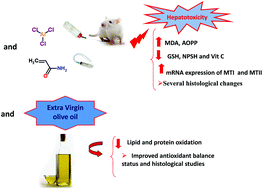Potential protective effects of extra virgin olive oil on the hepatotoxicity induced by co-exposure of adult rats to acrylamide and aluminum
Abstract
Extra virgin olive oil has been shown to be effective against oxidative stress associated diseases. In addition to the high quantities of oleic acid, it is rich in phenolic compounds. We investigated the protective efficacy of extra virgin olive oil (EVOO) against the hepatotoxicity induced by both aluminum and acrylamide. Animals were divided into four groups containing six rats each: group 1, serving as controls, received distilled water; group 2 received drinking water containing aluminum chloride (50 mg kg−1 body weight) and acrylamide (20 mg kg−1 body weight) by gavage; group 3 received both aluminum and acrylamide in the same ways as well as EVOO (300 μl) by gavage; group 4 received only EVOO by gavage for 3 weeks. The rats exposed to both aluminum and acrylamide exhibited oxidative stress observed by an increase in MDA, AOPP and a decrease in GSH, NPSH and vitamin C levels. The activities of CAT and GPx were decreased, while SOD activity was increased. The liver metallothioneins, such as MT1 and MT2 genes expression, were also increased. EVOO supplementation improved all the parameters mentioned above. The plasma transaminases (AST and ALT), LDH activities, glucose and albumin levels, TC, LDL-C levels, TC/HDL-C and LDL-C/HDL-C ratios were increased, while high density lipoprotein-cholesterol (HDL-C) and TG decreased. The co-administration of EVOO to acrylamide and aluminum treated rats restored their hepatic markers to near-normal values. Liver histological studies confirmed the biochemical parameters and the beneficial role of EVOO. These results suggest that extra virgin olive oil, when added to the diet, may have a beneficial role in decreasing the liver damage induced by both aluminum and acrylamide.


 Please wait while we load your content...
Please wait while we load your content...